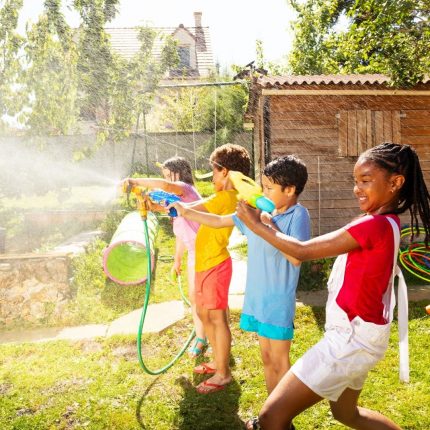
Skip the Boredom, Keep Kids Engaged This Summer
July 6, 2022Post Sponsored by Welcome Home Learning
School is out and another steamy summer has arrived. After two restless years of pandemic-induced isolation, it’s time to get outside and do something. Here in the city, there are many organizations offering summer camps, including the city itself. But, if you’re anything like me and waited too long, everything is already full! The expensive STEM-based summer camp is looking quite appealing right now, albeit the “easy route”.
Maybe you’re not like me and you planned ahead for the summer! No matter where you live, or what summer camps you were able to get into (you probably had a lot more foresight than me!), there is sure to be downtime at some point. If you are open to some ideas on what to do with the kids during those in-between periods, look no further! We have some ideas for you here, in this latest blog from Welcome Home Learning!
Build Something Special
Depending on your children’s ages, an activity that will keep them occupied for hours is a building project. Building activities are beneficial because they stimulate several areas of the brain and help kids develop critical skills like spatial awareness, fine motor skills, problem-solving, patience, focus, and more. They will learn to be more creative and imagine many possibilities. These are all helpful traits to have for school and in life.
When it comes to materials, you can decide to buy materials but most of the time, things you have around the house will suffice. It also depends on what it is you plan to build. For example: if you want them to build a life-sized cardboard box time machine, you are going to need a lot of cardboard! If you make a visit to the local grocery store, you can probably get a lot of these items for free.
Specific things they can try building include:
- A model house
- A “time machine” —or something that looks just like it!
- A rube goldberg machine, a chain reaction-type of machine/contraption
- A giant paper airplane
- A “cloud” castle with marshmallows
Activities to Stimulate
Summer is a time when kids like to “veg out” and allow their brains to enter into a state of dormancy! This results in academic regression and when they return to school, they have often forgotten much of what they learned the year before.
According to Psychology Today, in 1996 a systematic review of 39 studies found that summer learning loss equaled about one month of classroom learning. It also found that students tended to regress more in math skills compared to reading skills. Obviously, this is a problem because teachers must spend a significant amount of time revisiting concepts from previous years. The extra time spent reviewing prevents students from learning new material and slows their learning growth.
You can help combat this and keep your child’s brain actively learning with these educational activities:
- Join a Summer Reading Program with your nearest library
- Research a topic and write a speech about it
- Find out what planting zone you are in and make a list of plants and flowers for your zone
- Learn about science with MysteryScience Activities on MysteryScience.com
- Visit PBS Kids for educational games that keep them engaged!
Keep Them Socializing
We are social beings, kids included. Socialization is an important part of childhood development. Staying connected with peers provides kids and adults with a number of benefits like increased longevity, better physical health, improved mental health, and a lower risk of dementia.
Socializing helps kids develop skills in four areas: interpersonal, problem solving, conflict resolution, and survival. In interpersonal, they learn about sharing, joining a conversation, and taking turns talking. In problem-solving they learn how to decide what to do, what is an appropriate action to take, recognize when to apologize and how to ask for help. Conflict resolution skills help them deal with difficult people, be a good sport, and handle peer pressure. Lastly, for survival, they learn how to listen, ignore irrelevant objects, and follow directions.
You can help enjoy time with friends through these activities:
- Host an online movie-watching party
- Host a water play day for your friends
- Host a game night
- Host an online dance party
- Invite some friends over and plan a community service project
Grow Their Imagination
The development of a good imagination is an underrated skill. Being more imaginative allows a person to make creative connections and inferences using their past experience and knowledge. It enables them to create and think of ideas that don’t exist and develop innovative solutions to problems that do exist. Imagination helps us explore thoughts and feelings and enables empathy by being able to imagine what others might be feeling. In truth, the ability for imagination is one of the greatest abilities that humans possess.
To help kids develop their imagination, here’s a list of activities that you can have them try:
- Make a special/new food —try a recipe or create your own!
- Create a scavenger hunt
- Film and edit a movie trailer
- LEGO building competition
- Make a LEGO or Play-Doh stop-motion film
- Invent an animal that doesn’t exist and draw it. Write instructions on how to care for this animal!
Boost Their Communication Skills
We know that you know good communication at any age is important. It is especially important for young kids that are still learning to communicate their feelings and thoughts in productive ways. Since kids have not had many years to learn and apply good communication skills, it is important in their younger years to learn healthy methods of communication. The best way for kids to learn these methods is for parents to teach them and for kids to practice them.
For those students that just need to feel heard by someone and feel connected while they are away from school, deliberate communication with the outside world can be beneficial. Spending the time to intentionally connect with others can be highly beneficial during the Summer break. Here are a few suggestions:
- Find a pen pal and send letters through snail mail
- Call someone elderly and ask them questions
- Learn a new language using DuoLingo
- Send a message to a friend you haven’t spoken with in awhile
- Start a daily gratitude journal and write down what you are grateful for each day
While the summer break can be a disruption from the normal routine of things, it can also be a very special time for families. Summer gives us all more time to be together, learn and have fun. We encourage you to enjoy activities together so that the entire family can benefit from them. If you do try them, please share the results with us! We’d love to see pictures of your creations and other unique ideas on Facebook or Instagram.
Want more ideas? Download our list of 100 unique things to do this Summer!
Sources
- The Health Benefits of Socializing
- The Importance of Social Skills: Raising a Socially Intelligent Child
- Imagination
- What We Know About Summer Learning Loss: An Update
Additional Homeschool Resources
Latest Posts

While nearly every college and university today is eager to accept homeschooled students into their institutions, homeschooling families need to understand that their student’s application…
Read more >
Guest Post by Gabriel Morse For several years, I sat for long hours every day behind one of those battleship gray desks in a windowless, dull, gray office. The pay was enough to take care…
Read more >
This post is sponsored by Little Monsters Universe. I'm Tina Salmanowitz, an advocate for homeschooling and science education. With over a decade of experience as a science educator (in class…
Read more >


